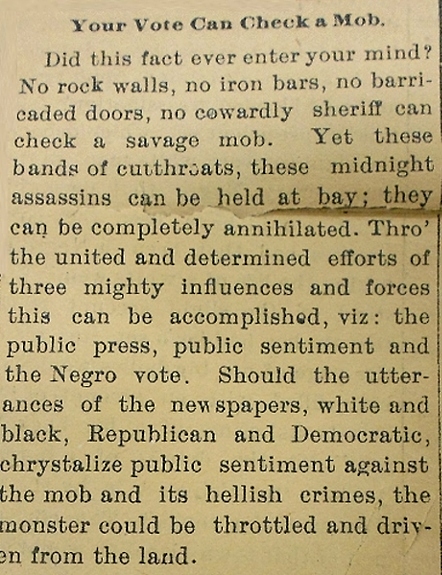
Racial Violence in the News during the Late 19th Century
Late nineteenth- and early twentieth-century newspapers often included articles about the racial violence that was becoming common in southern states during the Jim Crow era, but the white newspapers often told a different story than the black newspapers. The Austin Daily Statesman, for example, regularly noted instances of racial violence, including articles that highlighted the lynching of black men and women, the forced expulsion of blacks from towns, and the pending threat of violent retribution for actual or alleged attack or murders. The prevalence of news stories about racial and sexual violence, and a review of many articles in the white newspaper, the Austin Daily Statesman, suggests that the white press played a significant role in perpetuating the myth of the black “rape fiend.” The headlines of the articles, leave little doubt as to the biases of the white authors and editors in incidents were blacks were accused of violence against whites:
- “Don’t Like Negro Ravishers.” Incident in Kansas City, Kansas.
Austin Daily Statesman, April 13, 1893
“Shot and Burned a Murderer.” Incident in Eufaula, Alabama.
Austin Daily Statesman, April 15, 1893
“Will Hang for Rape” Incident in Columbus, South Carolina.
Austin Daily Statesman, April 15, 1893
These and other articles offered little sympathy for those accused of a crime, rarely assessed the validity of the evidence presented, and often omitted crucial facts pertinent to the story. In many cases, white mob violence was seen as a justifiable behavior when blacks were accused of violent crimes. Guilt was assumed, and the white authors and editors refrained from expressing any disgust or disdain for the total disregard for justice. Mob violence often resulted in someone being lynched, or even more horrifying, being tied down and burned to death.
An October 15, 1894 article in the Austin Daily Statesman talked about a white mob lynching of a black man accused of murder. The author stated: “This is the eighth lynching in central Kentucky in six months and the people have determined to put a stop to murder if they have to take the law into their hands every time a man is killed.” These words seem to condone the mob’s violent behavior by suggesting that the they were somehow administering justice.
An 1896 article in The Searchlight is titled: “Your Vote Can Check a Mob." The original newspaper is torn, and the end of the article is missing. But the unknown author is expressing the opinion that black voters can and should try to elect officials who would help curb mob violence. Another 1896 Searchlight article is titled: “Travesty Upon Justice.” In it, the newspaper’s city editor, James H. Harrison, describes the lack of justice in the murder of a black woman. She was shot and killed by a young white boy who was upset because she owed him 25 cents. The injustice occurred when the boy’s actions were quickly ruled to be an accidental murder, and the charges were dropped. At the end of the article, the author states:
"The partial manner in which the laws of our country are being administered is a burning disgrace to christianity and civilization. Who can say that a Negro has equality before the law in South Carolina, in Texas or the South? Not the city editor."